Aherne Innovation Prize at 2019 Banff Pork Seminar shared by two winners
Date posted: January 10, 2019
Each year as the winners of the F. X. Aherne Prize for Innovative Pork Production are announced, there is real interest at the Seminar and across the industry. Again in 2019 the stories behind the winners are quite remarkable, says Dr. Ben Willing, of the University of Alberta, chair of the Aherne Prize committee who presented the awards.
Two winners shared the prize at the Banff Pork Seminar, Jan. 8 to 10, 2019 in Banff, Alta.
Winners for the piglet creep protection device for loose housing were Brett, Jamie and Carl Israel of Carl Israel Farms Ltd. in Mapleton Twp., Ont. Winners for the Tattoo Master, an automatic tattooing solution were Daniel and Justin Maendel of Rosebank Colony in Miami, Man.
Willing says again this year the quality and number of applicants was strong, a sign of the tremendous innovation occurring on farms every day.
"This prize recognizes individuals who have developed either original solutions to pork production challenges or creative uses of known technology," he says. "We are pleased at Banff Pork Seminar to acknowledge these grassroots innovations in the pork industry."
The prize is named after industry icon, the late Dr. Frank Aherne, a professor of swine nutrition and production at the University of Alberta and a major force for science-based progress in the western Canadian pork industry.
Here, in their own words, are winners' descriptions of their innovations.
Piglet creep protection device designed for loose housing
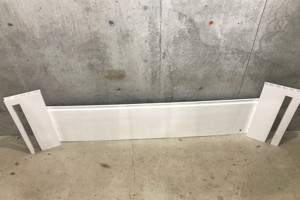
As loose housing becomes standard practice across gestation facilities, it is only a matter of time until the market will demand loose housed farrowing sows with litters.
That's the opinion of Brett, Jamie and Carl Israel of Carl Israel Farms Ltd. in Mapleton Twp., Ont., one of two winners who shared the 2019 F.X. Aherne Prize for Innovative Pork Production at the Banff Pork Seminar. Their piglet creep protection invention may help that occur, as they explain in their own words the reason behind their winning entry.
On paper the transition to loose housed farrowing sows makes sense. However, a major issue facing producers transitioning farrowing operations to loose housing pens from traditional confinement crates is the issue of inadvertent crushings.
In some instances, piglet crushing rates can be as high as 50 percent. Piglets born in these settings have a very difficult time finding the safe creep areas, as in most cases the total loose housed farrowing pen is significantly larger than conventional farrowing crates.
Having recently transitioned to organic pork production, our operation faced this very issue.
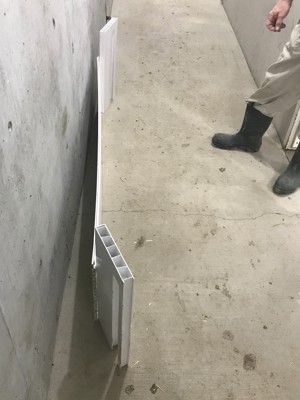
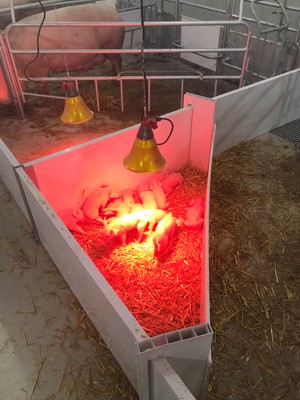
Our farrowing pens are 9 ft. x 9 ft. in size, with the sow being able to freely move around then pen. Upon our first organic sows farrowing we immediately identified that our mortality rates were impacting our bottom line and piglet well-being.
Out of pure desperation we took left over building materials from our recent barn construction, and fastened together a triangular plastic divider that slides over our pen creep dividers. The divider establishes a defined safe creep area under the heat lamp away from the reach of the sow.
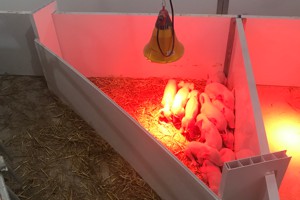
Upon farrowing, we collect all piglets and place them in the protected creep area. We wait until the sow is settled and calls for the pigs, then we release the piglets to nurse. We repeat this process over the litter's first 48 hours, ensuring that every time we enter the farrowing rooms we immediately secure the litter before the sow becomes unsettled.
By utilizing our creep protection device we have developed a process for training piglets to find the creep area, significantly improving our weaning rates. We have effectively increased our weaning rate by one piglet per sow per litter. Additionally, our divider wall provides a handy means of securing piglets for castration saving considerable amounts of time.
Ensuring that producers meet the changing demands of consumers requires on farm innovation. We are proud of our tool, and are confident that it's easy to make recycled nature could be adopted by producers across the industry.
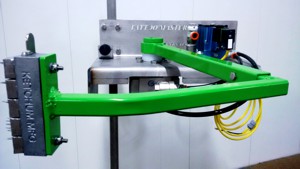
Tattoo Master automates tattooing, streamlines workload
Here's an idea that puts less stress on animals and the people handling them. And it automates tattooing, a job that normally requires hard work for people.
The Tattoo Master designed by Daniel and Justin Maendel of Rosebank Colony in Miami, Man. is a shared winner of the 2019 F.X. Aherne Prize for Innovative Pork Production at the Banff Pork Seminar. Here's an overview of their story in their own words.
Tattoo Master is an automatic tattooing solution designed to ease the burden of everyday hog tattooing while keeping animal welfare and legibility of tattoo as top priorities. It can be mounted on most automatic hog sorters with very little to no modifications, or custom fitted to most others. The simplified solution means the only thing that needs to be done is add ink every 400 hogs. The stainless steel unit can be easily washed with a power washer when required.
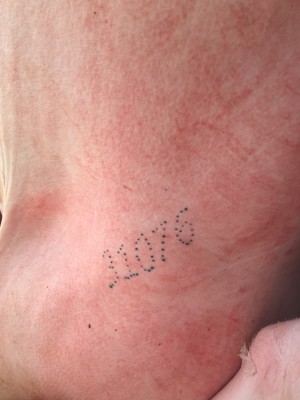
Here's how it works.
- Pig enters scale.
- Sorter gates close behind and in front of pig.
- Sorter verifies the correct weight of market hog.
- If the hog is market weight it receives a tattoo from the Tattoo Master unit.
- Front gate opens and market hog gently trots out of the scale to designated holding area.
To all of us in hog production it is a well-known fact that tattooing hogs can be a demanding and time consuming job. We all realize the importance of a legible tattoo at the processing plant because it is the only way for the packing plant to identify our hogs and pay us according to our grades.
Tattoo Master was developed in conjunction with a hog processing plant to ensure a legible tattoo. Another advantage is labor saving and worker safety. Tattoo Master applies the tattoo automatically versus a person swinging a manual tattoo slapper. Swinging a manual tattoo slapper can be a demanding job and sometimes lead to long term shoulder injury or other bodily harm.
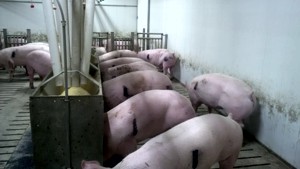
Some other improvements were also noted. The Tattoo Master hits every pig with the same amount of force required to make a legible tattoo. Sometimes barn staff doing the job manually will use a little too much force or not enough to make a legible tattoo. There is also less stress on market hogs at loading time because of the stress-free tattoo application from the previous day.
Start thinking for next year
"The Aherne Prize popularity continues to grow and is one that will be continued in future years," says Ben Willing. "Innovation comes from energy and ideas and as delegates head home from BPS 2019, we hope they will be encouraged to enter their innovations in upcoming years."
Return to the News Release Index